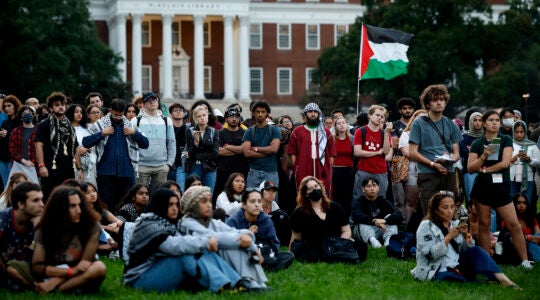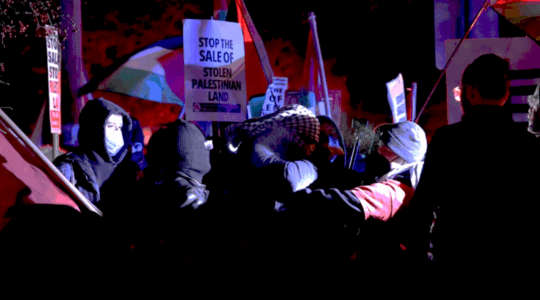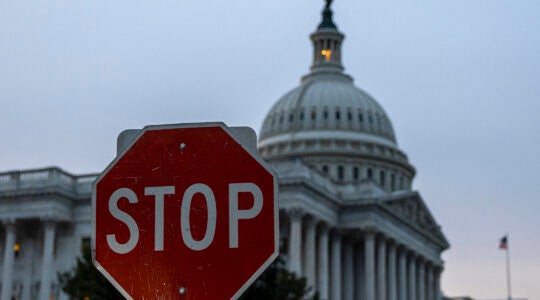ANN ARBOR – Leaders at the University of Michigan have condemned the reported assault of a 19-year-old student who was confronted about his Jewish identity.
According to police reports, the victim said he was assaulted over the weekend by a group of men who were walking behind him and “asked if he was Jewish.” When he said that he was, they attacked him, the report said.
The victim suffered minor injuries and didn’t require hospitalization, according to the police, who are referring to the investigation as a “bias-motivated assault” and an instance of “ethnic intimidation.” Police have not yet released any other information about the victim or assailants.
The alleged incident is the latest report of a Jewish student being attacked on a college campus this semester, nearly a year after student activism exploded and reports of antisemitism spiked following the outbreak of the Israel-Hamas war. Two Jewish students at the University of Pittsburgh were attacked last month while walking to their Hillel building; the suspect in that case was not a student.
The victim in Sunday’s alleged assault was attacked on a stretch of campus that is home to both Michigan Hillel and the Jewish Resource Center, an outpost of the Orthodox student outreach group Olami, as well as some Jewish fraternities and sororities. The Olami center was the site of antisemitic graffiti painted by student athletes last fall, prior to the Oct. 7 attack on Israel; those students later offered a public apology.
Michigan Hillel director Rabbi Davey Rosen wrote in a statement to the community that he was providing an “update that no Hillel director wants to send out,” and that he had been in touch with the university, law enforcement and a Jewish security agency.
“The safety of our students is our highest priority, and we appreciate law enforcement’s quick response. We know this is difficult news to hear especially as we are just beginning the school year,” he wrote. “In hard times, we at Michigan Hillel draw strength from this incredible community — students, parents, alumni, and friends — and that strength powers our pride and joy in being Jewish and, in particular, being Jewish at the University of Michigan.”
Michigan, which has large Jewish and Arab populations, has been a particular focal point of pro-Palestinian student activism that Jewish students say has made them feel unsafe. Student government leaders declared this year they would not fund any student activities unless the university divests from Israel, and the school was among the first this fall semester to see activists, who were not students, arrested for disruptive campus activities.
Last week Michigan’s Democratic Attorney General Dana Nessel, who is Jewish, announced criminal charges against 11 people related to a spring encampment at the school, including Jewish anti-Zionist protesters as well as two counter-protesters.
Jordan Acker, a Jewish regent at the university whose own business was physically targeted by protesters in recent months, wrote on X that he was “appalled” at what he called a “despicable hate crime.” And university president Santa Ono condemned the alleged assault in a statement on the social network X, as well as in a letter to the university.
“We strongly condemn and denounce this act of violence and all antisemitic acts,” Ono wrote in the letter, sent Monday early afternoon. “Antisemitism is in direct conflict with the university’s deeply held values of safety, respect and inclusion and has no place within our community.”
A study published by the Anti-Defamation League on Monday reported a massive increase in anti-Israel activity on U.S. campuses during the last academic year. The report included 28 instances of assault, most of them at rallies or student encampments surrounding the Israel-Hamas war. Whether Sunday’s alleged assault was connected to Israel is as yet unknown.
In addition to condemnation from Jewish groups and the university, the local branch of the Council on American-Islamic Relations — an organization that has criticized and clashed with Jewish and pro-Israel campus groups — denounced the attack and offered a reward of $1,000 for information that could lead to the perpetrator’s arrest.
“Everyone in Ann Arbor should be safe to express their ethnic and religious identity without fear of being assaulted nor menaced,” Dawud Walid, CAIR-MI’s executive director, said in a statement.
JTA has documented Jewish history in real-time for over a century. Keep our journalism strong by joining us in supporting independent, award-winning reporting.






